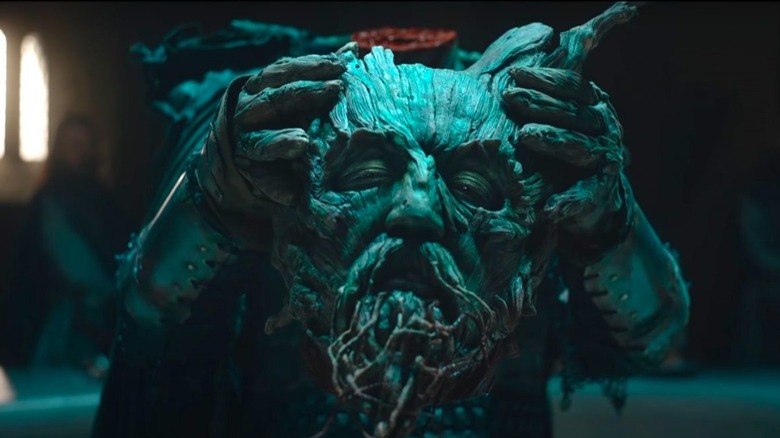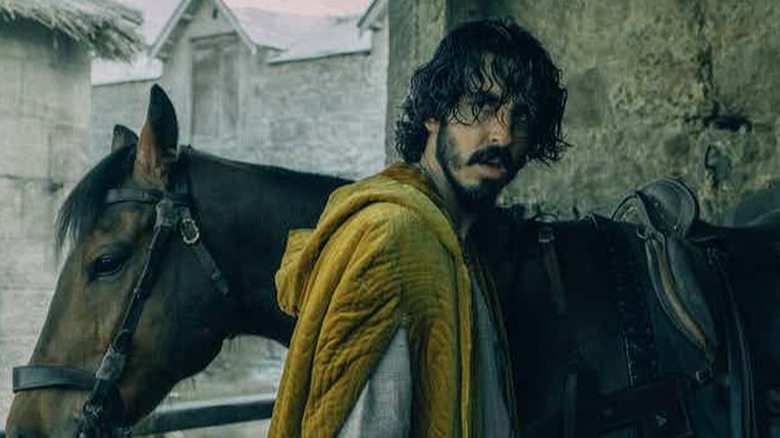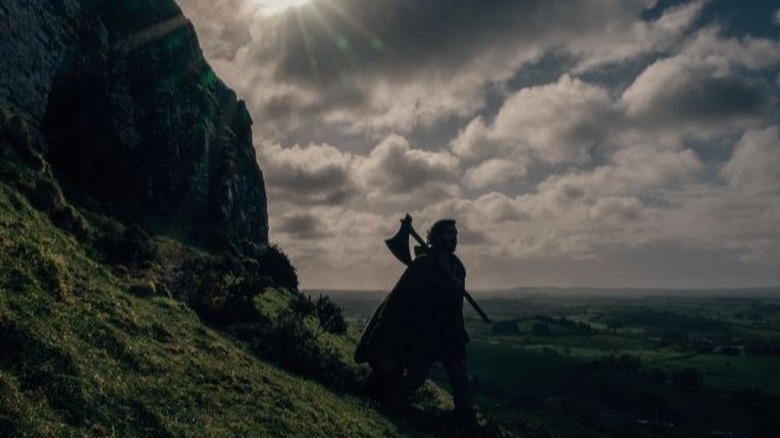Here's Why The Green Knight Is A Proper Christmas Movie
It's that time of year again. The hot cocoa is brewing, the tree is decorated, and the annual Twitter fights are breaking out. It wouldn't be the holiday season without a rousing debate about what constitutes a Christmas movie. Thankfully, this year we've got a great new potential Christmas classic to debate, in the form of David Lowery's Medieval epic "The Green Knight."
Before we dig into the details of why "The Green Knight" deserves a spot in the alternative Christmas canon, let's define a Christmas movie. The most basic, universally agreed upon parameter for a Christmas movie seem to me to be that the film has to take place almost entirely around Christmas. For instance, if a film has one great Christmas scene, but the rest of it takes place in the dog days of summer, that's not enough. Other common criteria are more or less stringent than that fairly universal baseline. Some people only ask that Christmas movies include a palpable sense of holiday spirit, which could mean something different for everyone. For others, the movie has to be about Christmas on a plot level, in an integral rather than tertiary way.
Here's some good news for fans of holiday films: "The Green Knight" fits all three of these criteria.
The Green Guy Is Basically Santa
The Dev Patel-led Arthurian tale begins on Christmas morning, with young Gawain (Patel) joining the Round Table for a feast. Soon, a massive, tree-like knight appears, and asks the court to play a Christmas game. When Gawain chops off the knight's head (it's all part of the game!), he enters into an agreement to seek out the Knight a year later so the being can return the blow. Thus, the cross-country journey that makes up most of the film also takes place around Christmastime.
"The Green Knight" is based on a 14th century epic poem called "Sir Gawain and the Green Knight," which was written by an anonymous poet. The poem draws on several literary and cultural traditions of the time, but one of the most interesting is the concept of a Yule monster. Yule monsters are essentially mythological alternatives to Santa Claus, and some of them bring violence and chaos as often as mirth. Before we thought of the December holidays as a time for brightness and joy, they were regularly imagined in myth as times of darkness and danger–because for people without modern technologies, they often were.
The Green Knight of Sir Gawain's poem and Lowery's film appears to be a blend between a traditional Yule monster (here's a handy guide to a few from the University of Notre Dame) and a more modern image of Santa Claus. In the poem, he arrives carrying a cheerful bough of holly, while the big-screen adaptation also gives him an austere, twiggy beard. By film's end, the Green Knight has become a friendlier figure, and the fond, throaty laugh with which he ends the film is more clearly reminiscent of the Santa we know.
Gawain's Story Is Brimming With Holiday Spirit
If you look closely, "The Green Knight" is full of Christmas spirit, albeit disguised in a mystical exterior. The original poem focuses a lot on feasting, a holiday season ritual that holds fast to this day. Much of the film and the poem it draws from also have to do with hospitality, and the responsibility of hosting strangers, not to mention gift-sharing. Sound familiar? These motifs reflect both our modern Christmas traditions, and elements of the Christian nativity story. In Gawain's world, though, there's enough room at the inn for Green Knights, ghosts, hunters and their seductive wives, and cowardly men alike.
This is where Lowery's adaptation actually outpaces the original text, and reaches ultimate Christmas movie status. Gawain is meant to be a great chivalric hero, but as shown again and again in "The Green Knight," he's actually a bit of a coward. He runs away from conflict, has a tryst with his new friend's wife, and flinches away from his fate during a moment of truth. If Gawain is meant to upheld as a near-religious figure of chivalry, as he does in the poem, then his on-screen faults and failures make him all the more relatable.
Who among us hasn't dipped out of a Christmas party conversation that wasn't going in a favorable direction? Who among us wouldn't rather sleep in a cozy, warm bed than leave home to be beheaded? Dev Patel's Gawain can count himself among the ranks of such holiday season heroes as Clark Griswold, Charlie Brown, and George Bailey: imperfect dudes who are just having a heck of a hard time getting through Christmas.
"The Green Knight" is definitely a Christmas movie. In fact, it's so Christmassy that we should probably be writing "off with your head" in all our Christmas cards. If you do choose to watch "The Green Knight" this holiday season, don't forget to set out a snack for the Yule monster of your choosing.


